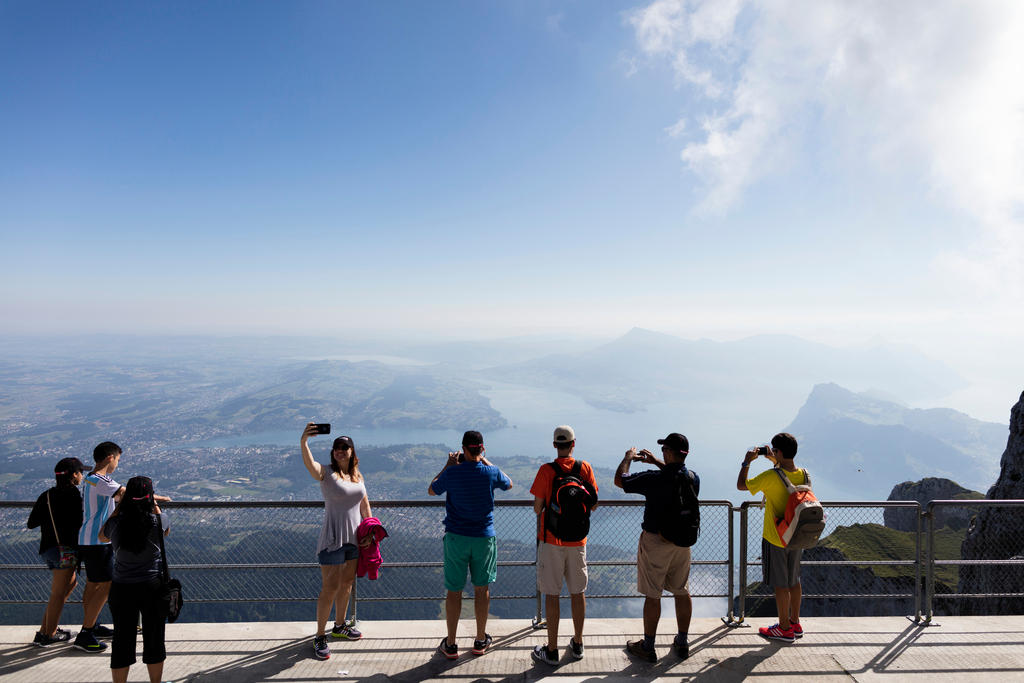Tourist industry faced with new challenges

There’s more trouble for Switzerland’s struggling tourism sector. New visa requirements are discouraging the Chinese from travelling to Europe. swissinfo.ch’s Chinese service reports on the challenges for the Swiss tourist industry.
Figures issued by the Federal Statistical Office (FSO) have revealed a structural change in where tourists are coming from. The number of visitors from Europe, the traditional market of Switzerland’s inbound tourism, has been declining sharply. Meanwhile, the numbers of visitors from China, the Gulf states, and Southeast Asian countries had been on the rise.
But the picture changed over the winter, with tourists from China declining for the first time.
The Swiss National Tourist Office, Switzerland Tourism, says the new requirement for biometric fingerprint data for visas is one of the key factors.
This has been mandatory for anyone applying for a visa to Europe’s Schengen zone of countries, including Switzerland, since last November. This means all Chinese must travel to a Swiss consulate in person to apply.
There was an unprecedented negative growth of inbound Chinese tourists this past winter, says Simon Bosshart, the Switzerland Tourism director responsible for the Asia Pacific region. There was a slight decrease in January, followed by a significant 20% decline in February and a 5.4% drop in March.
In 2015, overnight stays in Swiss hotels totaled 35.6 million, among which 19.6 million came from abroad, and 11.8 million from Europe. These three figures dropped respectively by 0.8%, 1.7%, and 9.3% over last year. The number of European overnight visitors reached its lowest level since 1958. Such a visitor drain has jeopardized employment in tourism sector, and other tourism-related industries.
The numbers of overnight stays from the following countries have fallen substantially: Germany (-12.3% to 541,000), Netherlands (-14.4%), France (-6.2%), Italy (-7.6%), and Belgium (-9.5%). Stays by Russians plunged 30.7% and 10.3% from Japan. The number of visitors from the United Kingdom also dropped by 1.6%.
In partial compensation, the number of Asian tourists increased with one-year growth of 18.6%, exceeding the four-million mark, a historical high.
Mainland China reached a new high after surpassing the one million mark in 2014. In 2015, the fastest growing market rose by 33.3%, equivalent to 344,000 overnight stays, totaling 1.378 million in 2015. China has now become the fourth largest source of tourists for Switzerland, after Germany, the United States and UK.
Second in growth only to Mainland China were the Gulf States, which saw a 20.6% increase over the previous year. There were also increases in tourists from India and South Korea (20.5%), the US (4.7%), and Africa (7.5%).
Bosshart provided three reasons for the slowdown.
Fragile economy, terrorism and visa troubles
Switzerland’s fragile economy and China’s decelerating economic growth, as well as a weaker renminbi compared to the Swiss franc, are part of the reasons for the decreased number of Chinese travelers to Switzerland, according to the Chinese tourism authorities.
The increasing terrorist attacks and ongoing refugee crisis have also scared off many potential tourists. Though short-term tension normally fails to generate a lasting effect, the ever-increasing terrorist scares and unpredictability of terrorism certainly adds to the risk of a further slide in tourism.
Added to these problems, the new requirement for biometric fingerprint data has complicated the visa application process for some tourists. All members of the Schengen area are doing everything at their disposal to find a possible solution for Chinese visitors. Switzerland, a non-EU member state, has been actively seeking bilateral consultations.
While Switzerland as a tourist destination has been struggling to combat various unfavorable factors, the situation is exacerbated by the newly-issued visa policy.
“In order to submit fingerprint data for a visa, Chinese tourists have to trudge through the vast expanses of their own country, which is nothing short of an additional barrier,” Jürg Schmid, head of Switzerland Tourism said in an interview with Swiss public television, SRF. (Editor’s Note: Residents who live in China’s third-tier cities cannot apply for visa at a consulate and return on the same day.)
On 15 December 2008, Switzerland added its name to the list of Schengen states and started to issue the Schengen visa. A Schengen visa holder can travel in Switzerland and is allowed to move freely within all Schengen zone countries.
No visa is required for citizens from the United States, Canada, New Zealand, Australia, Israel, Singapore, European Schengen Area, European Union, or European Free Trade Association (EFTA) countries for a stay of up to 90 days.
Bosshart went on to say that the tourism office was in talks with the Swiss authorities to look at ways to simplify the visa application process, such as the use of mobile biometric stations, and temporary fingerprint collecting points as alternatives to the existing fixed places.
Another notable point is that once the biometric data is collected, it can be re-used for further visa applications over a five-year period. Visa application offices of all Schengen states have access to such data. Only first-time applicants need to go to a consulate in person, and in five years’ time, changes can be taken care of by mail.
Bosshart said his office was optimistic about the introduction of biometric data for visas, and stated that if the above measures were implemented, the negative impact of the new visa requirement would be by and large eliminated.
Love and Hate
Switzerland Tourism has responded to the new challenges by increasing spending on manpower and resources to promote travel to the country in winter, targeting domestic tourists and visitors from emerging economies such as China, India and Brazil.
A number of Swiss media have published stories about the uncivilized behaviors of some Chinese tourists while also reporting on the importance of the Chinese for the tourist industry and their influence on local communities.
Chinese visitors are gaining a reputation for poor behavior in many countries – spitting, speaking loudly, and even making a mess after using a toilet or dining in a restaurant. These acts are abhorred by many Swiss.
Articles such as “The Situation is Intolerable”, “Trouble in Ebikon’s Chinatown”, and even “Too Loud, Too Rude: Switzerland Introduces Separate Trains for Chinese Tourists” have been published in Swiss newspapers. The Swiss really have a love-hate relationship with Chinese tourists.
The tourism sector is one of the most important pillars of the Swiss economy. Will the industry be able to brave the storm of the volatile market and meet tourists’ demands?
Developing a sensible market strategy is vital in turning Switzerland into a magnet for tourists, and in driving tourism-related industries.
Russians: the substantial depreciation of the ruble and the country’s domestic instability are responsible for the slump in Russian visitors. The Russian government has called on its people to travel within Russia or Asia. The biometric fingerprint requirement has played little part in the decline.
Brazilians: Brazilians are not required to obtain a Schengen visa, but Switzerland’s weak economy and tourists’ anxiety towards Europe have dampened visitors’ enthusiasm. Nevertheless, a modest growth in Brazilian tourist number (+1.4%) has been reported.
United Arab Emirates: Citizens were granted visa-free access to Switzerland in May 2015. Residents of other Gulf states have access to visa application centres dotted around their countries. The large number of centres has helped keep visitors from these countries coming to Switzerland, despite the new visa requirement introduced two years ago.
Indians: Although Indians, like the Chinese, need to provide their biometric fingerprint data as part of their visa applications, Indian visitors are not affected by the new policy. The number of Indian tourists has unexpectedly increased.
(source: André Aschwanden, Public relations manager, Switzerland Tourism)
Translated from Chinese by Yi Dong

In compliance with the JTI standards
More: SWI swissinfo.ch certified by the Journalism Trust Initiative












You can find an overview of ongoing debates with our journalists here . Please join us!
If you want to start a conversation about a topic raised in this article or want to report factual errors, email us at english@swissinfo.ch.